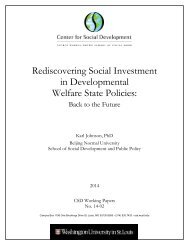Exploring and Assessing Intercultural Competence - Center for ...
Exploring and Assessing Intercultural Competence - Center for ...
Exploring and Assessing Intercultural Competence - Center for ...
Create successful ePaper yourself
Turn your PDF publications into a flip-book with our unique Google optimized e-Paper software.
<strong>Exploring</strong> <strong>and</strong> <strong>Assessing</strong> <strong>Intercultural</strong> <strong>Competence</strong><br />
- new perspectives, observe differences, underst<strong>and</strong>ing, sense of realism (5)<br />
- self-development, independence, confidence (3)<br />
- adaptability (2)<br />
- communication / language skills (2)<br />
- non-judgmental (i.e., suspend judgment) (2)<br />
- patience (2)<br />
- sense of humor (2)<br />
- appreciation (2)<br />
- self-awareness (2)<br />
- ability to like people <strong>and</strong> get on with them (1)<br />
- curiosity (1)<br />
- reflective (1)<br />
However, be<strong>for</strong>e finalizing any hierarchy, we would also need to add results from items checked<br />
in the attribute list itself. Of the 15 attributes, alumni most often stressed open-mindedness; one<br />
stressed adaptability, curiosity, <strong>and</strong> underst<strong>and</strong>ing; several others also emphasized qualities of<br />
tolerance <strong>and</strong> empathy. In Part I, item 36, some added: awareness, underst<strong>and</strong>ing, knowledge,<br />
acceptance, tolerance, <strong>and</strong> empathy. In Part II, items 16 & 32, the following qualities were cited:<br />
cooperativeness, stamina, a desire to learn (motivation), <strong>and</strong> language ability (the last two are<br />
explored further below). Not specifically cited in open-ended responses were these items from the<br />
original list of 15 were the following 3 items: flexibility, perceptive, <strong>and</strong> tolerance of<br />
ambiguity.<br />
Findings<br />
All attributes commonly cited in the literature were confirmed as competencies relevant <strong>and</strong><br />
important to the intercultural experience. All participants indicated they progressed <strong>and</strong><br />
developed in each area during their sojourn. From among the 15 attributes cited, they highlighted<br />
several items in particular, suggesting a possible hierarchy of importance (further research<br />
needed). They also identified additional qualities not on our list (cited below), including host<br />
language ability (discussed below under Assertion 2). Hierarchy aside, <strong>for</strong> the moment we can<br />
organize attributes in clusters as follows:<br />
a. attributes cited in the literature (in no particular order):<br />
tolerance, flexibility, patience, sense of humor, appreciation of differences, suspending<br />
judgment, adaptability, curiosity, open-mindedness, motivation, self-reliance, empathy,<br />
clear sense of self, perceptiveness, <strong>and</strong> tolerance of ambiguity<br />
b. attributes stressed by respondents (in order of importance):<br />
open-mindedness / positive attitude / acceptance / tolerance<br />
motivation<br />
new perspectives / observe differences / underst<strong>and</strong>ing / sense of realism<br />
self-development / independence / confidence<br />
adaptability<br />
communication / language skills<br />
non-judgmental (i.e., suspend judgment)<br />
patience<br />
sense of humor<br />
appreciation<br />
self-awareness<br />
<strong>Center</strong> <strong>for</strong> Social Development<br />
Washington University in St. Louis<br />
32
















